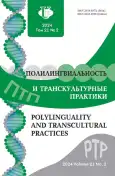Experience of Self-Translation of a Lyric Poem from Russian into Erzya by a Bilingual Poet
- Authors: Sharonova E.A.1, Sharonov A.M.2
-
Affiliations:
- Mordovian State University named after N.P. Ogaryov
- Scientific Center for Socio-Economic Monitoring
- Issue: Vol 21, No 2 (2024)
- Pages: 295-307
- Section: THEORY AND PRACTICE OF TRANSLATION
- URL: https://journal-vniispk.ru/2618-897X/article/view/326936
- DOI: https://doi.org/10.22363/2618-897X-2024-21-2-295-307
- EDN: https://elibrary.ru/NTPWJH
- ID: 326936
Cite item
Full Text
Abstract
The purpose of the study is to consider the experience of self-translation of a lyric poem from Russian into Erzya by a bilingual poet. An analysis of the experience of automatic translation from Russian into Erzya allowed us to come to the conclusion that each translated work has its own “code of behavior,” which makes it uniquely withstand the translation procedure. The “code of behavior” of a poem consists of a number of factors - genre, theme, main idea, motives, image of the lyrical hero, the author’s personality, national and non-national signs and symbols, the time of creation of the text and the time of its translation. All this affects how the work will enter the space of another language. It may ‘agree’ to a new linguistic shell and then retain its original concept, without losing anything, but also without gaining anything, or it ‘may begin to resist’ the new sound, which will cause the birth of new meanings, and therefore new images, and complicate the nature of artistic expression. The native language, as a language genetically inherited from parents, conveys to a person the so-called “innate ideas” recorded in the gene pool of his ancestors. And they play an important role both when creating an original work and when translating it into another language. Research methods: descriptive, genetic, comparative.
About the authors
Elena A. Sharonova
Mordovian State University named after N.P. Ogaryov
Author for correspondence.
Email: sharon.ov@mail.ru
ORCID iD: 0000-0003-0221-4427
SPIN-code: 4820-3264
Doctor of Philology, Professor, Professor of the Department of Russian and Foreign Literature
68 Bolshevik St, Saransk, 430000, Republic of Mordovia, Russian FederationAlexander M. Sharonov
Scientific Center for Socio-Economic Monitoring
Email: sharon.ov@mail.ru
ORCID iD: 0000-0002-2724-3112
SPIN-code: 5550-5047
Doctor of Philology, Professor, Chief Researcher
39a B. Khmelnitsky St, Saransk, 430000, Republic of Mordovia, Russian FederationReferences
- Bakhtikireeva, U.M., and N.A. Tokareva. 2023. “Translation of culture in the Russian-language works of a non-Russian author.” Social and humanitarian sciences in the Far East, vol. 20, no.1, pp. 80‒86. Print. (In Russ.)
- Bakhtikireeva, U.M. 2022. “Reflections on bilingualism and translingualism.” In Linguistics in dialogue with other fields of knowledge: legal linguistics and discursive linguistics, communicative linguistics and linguoculturology: collection of scientific articles. Vitebsk: Vitebsk State University named after P.M. Masherov, pp. 6‒12. Print. (In Russ.)
- Finkel, A.M. 1962. “About automatic translation”. In Theory and criticism of translation. Leningrad: Nauka publ., pp. 12‒15. Print. (In Russ.)
- Sharonov, A.M., and E.A. Sharonova. 2023. “Bilingualism in the Author’s Translation of the National Epic: on the Material of ‘Mastorava.” Polylinguality and Transcultural Practices, vol. 20, no. 2, pp. 298–311. https://doi.org/10.22363/2618-897X-2023-20-2-298-311 Print. (In Russ.).
- Arzamazov, A.A. 2023. “Ethnomythological ‘flicker’ in the poems of Alexander Sharonov.” In Russian folklore of Mordovia in the context of world culture: collection of materials of the All-Russian scientific conference (Seventh All-Russian scientific and pedagogical readings with international participation). Saransk: Mordovian University Publishing House, pp. 3‒8. Print. (In Russ.)
- Arzamazov, A.A. 2022. “The reality of Erzya-Russian poetic bilingualism: the artistic phenomenon of Alexander Arapov.” Polylinguality and transcultural practices, vol. 19, no. 4, pp. 622‒636. Print. (In Russ.).
- Arzamazov, A.A. 2020. “National literature vs Russian language: Yukagir and Chechen scripts.” In Center and periphery in the Russian cultural space of the XIX–XXI centuries. Kazan: Zaman Publ., pp. 21‒50. Print. (In Russ.)
- Arzamazov, A.A. 2020. “Russian instead of national: scenarios of language ‘switching’ in fiction.” In Materials of the International Educational Salon: collection of articles. Izhevsk: Izhevsk Institute of Computer Research, pp. 59‒73. Print. (In Russ.).
- Arzamazov, A.A. 2023. “At the crossroads of languages and cultures. Poetry of the Eastern Mari Gani Gadiatov.” Bulletin of Naberezhnye Chelny State Pedagogical University, no. 1, pp. 36‒39. Print. (In Russ.)
- Khairutdinova, G.A. 2009. “On the problem of aesthetics of linguistic units.” Scientific notes of the Kazan State University. Series: Humanities, vol. 151, no. 6, pp. 22‒30. Print. (In Russ.)
- Chankaeva, L.R. 2010. “Russian-language poetry by Yu. Sozarukov: preservation of national flavor.” Traditions, customs and customs of the peoples of Russia: in 2 volumes. St. Petersburg: Lema publ., vol. 2, pp. 384–388. Print. (In Russ.).
- Lotman, Yu. M. 2023. The structure of literary text. Moscow: EKSMO publ. Print. (In Russ.).
Supplementary files









